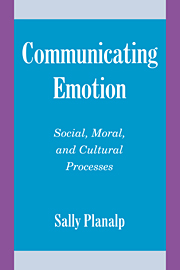Book contents
- Frontmatter
- Dedication
- Contents
- Acknowledgments
- Introduction
- 1 How Important Is Emotion in Everyday Interaction?
- 2 How and Why Is Emotion Communicated?
- 3 Is Emotional Communication Spontaneous or Strategic?
- 4 How Is Emotional Meaning Constructed Through Communication?
- 5 How Is Emotional Meaning Both Personal and Social?
- 6 How Do Emotion Messages Communicate Moral Meaning?
- 7 How Is Emotional Communication Grounded in Common Human Experience and Diverse Cultures?
- Epilogue: What is the Future of Emotional Meaning?
- References
- Author Index
- Subject Index
Epilogue: What is the Future of Emotional Meaning?
Published online by Cambridge University Press: 05 February 2015
- Frontmatter
- Dedication
- Contents
- Acknowledgments
- Introduction
- 1 How Important Is Emotion in Everyday Interaction?
- 2 How and Why Is Emotion Communicated?
- 3 Is Emotional Communication Spontaneous or Strategic?
- 4 How Is Emotional Meaning Constructed Through Communication?
- 5 How Is Emotional Meaning Both Personal and Social?
- 6 How Do Emotion Messages Communicate Moral Meaning?
- 7 How Is Emotional Communication Grounded in Common Human Experience and Diverse Cultures?
- Epilogue: What is the Future of Emotional Meaning?
- References
- Author Index
- Subject Index
Summary
Few people want to take the audacious step of speculating on what our emotional lives will be like in the future, and justifiably so. For one thing, you have to admit your social constructionist tendencies to believe that our emotional futures will vary one whit from the past. If emotion is predetermined in our genes, our emotional tomorrows will be very much like our emotional yesterdays, with change measured not over centuries or millennia but over centuries of millennia. Research on the history of emotion has convinced me, however, that this just isn't so. Earlier time periods, even measured in decades, show emotional profiles different from the ones we have now, and we have no reason to believe ours will hold still for the next generation.
Nevertheless, believing that emotional meaning will change tells us nothing about how it will change. The truth of the matter is – nobody knows. Historians, I believe, give us better-informed speculations than others, but they are inclined to limit their speculations to changes that can be glimpsed now. They are also very clear that the one thing we know with certainty from the history of emotion is that we cannot predict anything with certainty. All manner of unforeseen events, technological and cultural developments, changes in demographic patterns, and sheer human serendipity influence the course of history in unpredictable ways. The history of emotion is no exception (Stearns, 1994).
I still believe that knowing that we are probably wrong in our speculation is no reason to refrain from speculating, if for no other reason than that it makes us examine the here-and-now more closely and more critically. Perhaps the trends we see now will be magnified in the future or perhaps they will disappear; we cannot know. We do know, however, that now is the only time we can do anything about them, and if we have learned anything from this book (both you and I), it is that we can do something about them both individually and collectively. We can be emotionally creative by paying attention to our feelings, by cultivating certain habits of thought, and by encouraging desired emotional stances in others as well as ourselves.
- Type
- Chapter
- Information
- Communicating EmotionSocial, Moral, and Cultural Processes, pp. 235 - 242Publisher: Cambridge University PressPrint publication year: 1999

